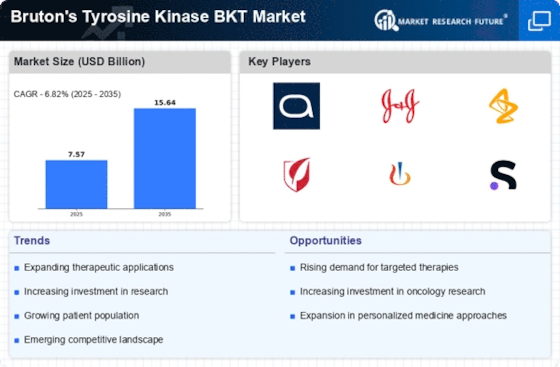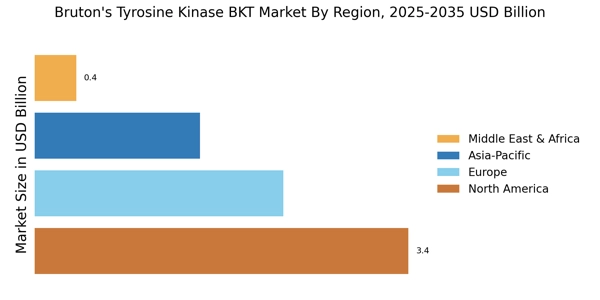Advancements in Targeted Therapies
The evolution of targeted therapies represents a significant advancement in the treatment landscape for various cancers, particularly those associated with Bruton's Tyrosine Kinase. The Bruton's Tyrosine Kinase BKT Market is likely to benefit from innovations in drug formulations and delivery mechanisms that enhance efficacy and reduce side effects. Recent developments in monoclonal antibodies and small molecule inhibitors have shown promising results in clinical trials, indicating a shift towards more personalized medicine. As healthcare providers increasingly adopt these therapies, the market is expected to expand, driven by the need for more effective treatment options that cater to individual patient profiles. This trend underscores the potential for growth within the Bruton's Tyrosine Kinase BKT Market.
Growing Investment in Oncology Research
The surge in investment directed towards oncology research is a crucial factor influencing the Bruton's Tyrosine Kinase BKT Market. Pharmaceutical companies and research institutions are allocating substantial resources to explore novel therapeutic targets, including Bruton's Tyrosine Kinase. This influx of funding is likely to accelerate the pace of clinical trials and the development of new drugs. According to recent reports, the oncology research market is projected to reach several billion dollars in the coming years, reflecting a robust commitment to advancing cancer treatment. As more resources are dedicated to understanding the mechanisms of hematological malignancies, the Bruton's Tyrosine Kinase BKT Market stands to gain significantly from these advancements.
Rising Awareness and Education Initiatives
The increasing awareness of hematological disorders and the role of Bruton's Tyrosine Kinase in their treatment is a significant driver for the Bruton's Tyrosine Kinase BKT Market. Educational initiatives aimed at healthcare professionals and patients are fostering a better understanding of these conditions and the available treatment options. As awareness grows, so does the likelihood of early diagnosis and treatment, which can lead to improved patient outcomes. Furthermore, advocacy groups are playing a vital role in promoting research and funding for therapies targeting Bruton's Tyrosine Kinase. This heightened awareness is expected to translate into increased demand for therapies, thereby propelling the Bruton's Tyrosine Kinase BKT Market forward.
Regulatory Support for Innovative Therapies
Regulatory bodies are increasingly providing support for the development of innovative therapies, which is likely to have a positive impact on the Bruton's Tyrosine Kinase BKT Market. Initiatives aimed at expediting the approval process for breakthrough therapies are becoming more common, allowing for faster access to new treatments for patients. This regulatory environment encourages pharmaceutical companies to invest in research and development, knowing that their innovative products may receive quicker market entry. The emphasis on patient-centric approaches and the need for effective treatment options for hematological disorders further bolster this trend, suggesting a favorable outlook for the Bruton's Tyrosine Kinase BKT Market.
Increasing Prevalence of Hematological Disorders
The rising incidence of hematological disorders, such as chronic lymphocytic leukemia and non-Hodgkin lymphoma, appears to be a primary driver for the Bruton's Tyrosine Kinase BKT Market. As these conditions become more prevalent, the demand for targeted therapies that inhibit Bruton's Tyrosine Kinase is likely to surge. Recent estimates suggest that the global burden of hematological malignancies is increasing, with millions affected annually. This trend necessitates the development of effective treatment options, thereby propelling the market forward. Furthermore, the growing awareness of these disorders among healthcare professionals and patients may lead to earlier diagnoses and increased treatment rates, further stimulating the Bruton's Tyrosine Kinase BKT Market.

















